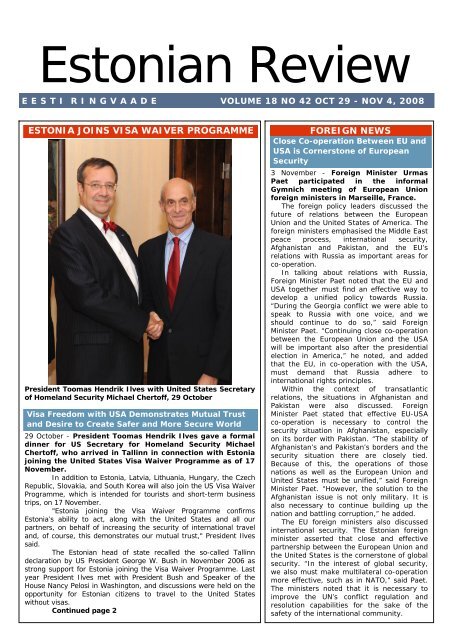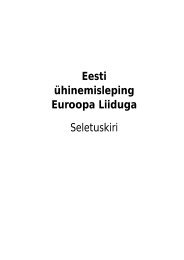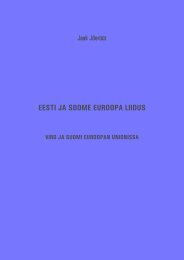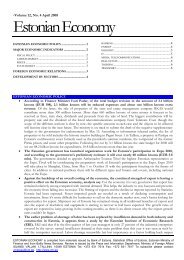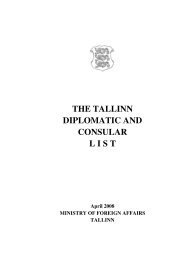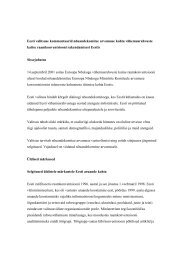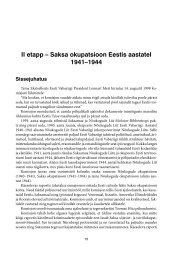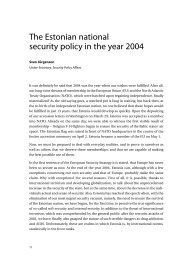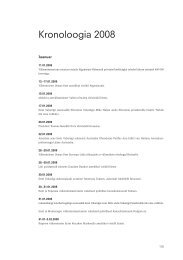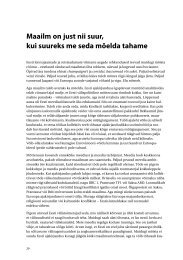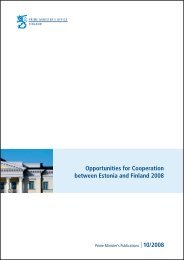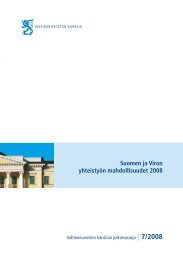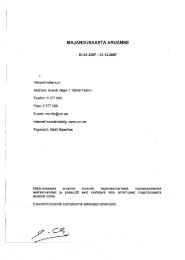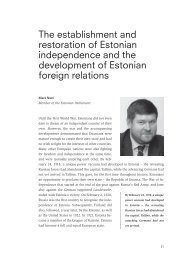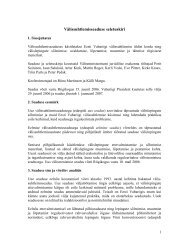Estonian Review
Estonian Review
Estonian Review
You also want an ePaper? Increase the reach of your titles
YUMPU automatically turns print PDFs into web optimized ePapers that Google loves.
<strong>Estonian</strong> <strong>Review</strong><br />
E E S T I R I N G V A A D E VOLUME 18 NO 42 OCT 29 - NOV 4, 2008<br />
ESTONIA JOINS VISA WAIVER PROGRAMME<br />
President Toomas Hendrik Ilves with United States Secretary<br />
of Homeland Security Michael Chertoff, 29 October<br />
Visa Freedom with USA Demonstrates Mutual Trust<br />
and Desire to Create Safer and More Secure World<br />
29 October - President Toomas Hendrik Ilves gave a formal<br />
dinner for US Secretary for Homeland Security Michael<br />
Chertoff, who arrived in Tallinn in connection with Estonia<br />
joining the United States Visa Waiver Programme as of 17<br />
November.<br />
In addition to Estonia, Latvia, Lithuania, Hungary, the Czech<br />
Republic, Slovakia, and South Korea will also join the US Visa Waiver<br />
Programme, which is intended for tourists and short-term business<br />
trips, on 17 November.<br />
"Estonia joining the Visa Waiver Programme confirms<br />
Estonia’s ability to act, along with the United States and all our<br />
partners, on behalf of increasing the security of international travel<br />
and, of course, this demonstrates our mutual trust," President Ilves<br />
said.<br />
The <strong>Estonian</strong> head of state recalled the so-called Tallinn<br />
declaration by US President George W. Bush in November 2006 as<br />
strong support for Estonia joining the Visa Waiver Programme. Last<br />
year President Ilves met with President Bush and Speaker of the<br />
House Nancy Pelosi in Washington, and discussions were held on the<br />
opportunity for <strong>Estonian</strong> citizens to travel to the United States<br />
without visas.<br />
Continued page 2<br />
FOREIGN NEWS<br />
Close Co-operation Between EU and<br />
USA is Cornerstone of European<br />
Security<br />
3 November - Foreign Minister Urmas<br />
Paet participated in the informal<br />
Gymnich meeting of European Union<br />
foreign ministers in Marseille, France.<br />
The foreign policy leaders discussed the<br />
future of relations between the European<br />
Union and the United States of America. The<br />
foreign ministers emphasised the Middle East<br />
peace process, international security,<br />
Afghanistan and Pakistan, and the EU’s<br />
relations with Russia as important areas for<br />
co-operation.<br />
In talking about relations with Russia,<br />
Foreign Minister Paet noted that the EU and<br />
USA together must find an effective way to<br />
develop a unified policy towards Russia.<br />
“During the Georgia conflict we were able to<br />
speak to Russia with one voice, and we<br />
should continue to do so,” said Foreign<br />
Minister Paet. “Continuing close co-operation<br />
between the European Union and the USA<br />
will be important also after the presidential<br />
election in America,” he noted, and added<br />
that the EU, in co-operation with the USA,<br />
must demand that Russia adhere to<br />
international rights principles.<br />
Within the context of transatlantic<br />
relations, the situations in Afghanistan and<br />
Pakistan were also discussed. Foreign<br />
Minister Paet stated that effective EU-USA<br />
co-operation is necessary to control the<br />
security situation in Afghanistan, especially<br />
on its border with Pakistan. “The stability of<br />
Afghanistan’s and Pakistan’s borders and the<br />
security situation there are closely tied.<br />
Because of this, the operations of those<br />
nations as well as the European Union and<br />
United States must be unified,” said Foreign<br />
Minister Paet. “However, the solution to the<br />
Afghanistan issue is not only military. It is<br />
also necessary to continue building up the<br />
nation and battling corruption,” he added.<br />
The EU foreign ministers also discussed<br />
international security. The <strong>Estonian</strong> foreign<br />
minister asserted that close and effective<br />
partnership between the European Union and<br />
the United States is the cornerstone of global<br />
security. “In the interest of global security,<br />
we also must make multilateral co-operation<br />
more effective, such as in NATO,” said Paet.<br />
The ministers noted that it is necessary to<br />
improve the UN’s conflict regulation and<br />
resolution capabilities for the sake of the<br />
safety of the international community.
US Visa Waiver Programme<br />
(continued from page 1)<br />
"At that time, we spoke about the Visa Waiver<br />
Programme as something in the future, but as<br />
something that was self-evidently necessary<br />
situation between two strong allies," President Ilves<br />
said. "I am glad that now—after mutual thorough<br />
consultations and the resolution of technical issues—<br />
we have arrived this far."<br />
President Ilves acknowledged the effective cooperation<br />
in the fields of the interior and justice of<br />
the two countries as well as between diplomats that<br />
preceded Estonia joining the United States Visa<br />
Waiver Programme.<br />
"The negotiations and the concluded agreements<br />
regarding the exchange of information necessary for<br />
the prevention of serious crime only serve one<br />
objective, which is a safer and more secure world for<br />
our people," the <strong>Estonian</strong> head of state said.<br />
President Ilves invoked a broader view of safety<br />
and security than usual and focused on the topic of<br />
cyber security. According to President Ilves, the<br />
amendment of international law and domestic<br />
legislation is important for guaranteeing cyber<br />
security, into order to make it possible to pursue<br />
cyber criminals and hold them accountable. In<br />
addition, the owners of information systems must<br />
understand their responsibility for the rational<br />
utilization of these systems, the <strong>Estonian</strong> Head of<br />
State said. One must also not forget that<br />
international steps to guarantee cyber security must<br />
not hinder the opportunity for the unrestricted use<br />
of information technology.<br />
In Estonia, the Visa Waiver Programme will apply<br />
to <strong>Estonian</strong> citizens who must have a biometric<br />
passport for travel to the United States; an<br />
electronic application must also be filled out at least<br />
48 hours before the trip, which will ascertain within<br />
a few minutes whether the person is welcome in the<br />
USA or not.<br />
Secretary of Homeland Security Michael Chertoff<br />
also met with Foreign Minister Urmas Paet, who<br />
stated that the USA is demonstrating great trust in<br />
the <strong>Estonian</strong> nation and its citizens with its decision.<br />
However, Foreign Minister Paet also made it clear at<br />
the meeting that Estonia thinks it is important that<br />
the USA Visa Waiver Programme be expanded to<br />
include all European Union nations.<br />
Georgia Must Focus on the Future<br />
3 November - President Toomas Hendrik Ilves<br />
met with Georgian Head of State Mikheil<br />
Saakashvili in Riga. Both heads of state were<br />
participating in the third Riga Conference on foreign<br />
and security policy.<br />
“Georgia and its friends must focus most<br />
emphatically on the future, and only on the future—<br />
this implies self-confidence, democracy and the<br />
intensification of democracy, a market economy,<br />
and the consolidation of society,” President Ilves<br />
said.<br />
The <strong>Estonian</strong> head of state affirmed support for<br />
the continuation of Georgia’s NATO-directed<br />
reforms.<br />
“The consistency and decisiveness of the efforts<br />
made in this regard has been a powerful engine for<br />
the reform policies of all the countries that have<br />
aspired to accession to NATO, which does not let<br />
governments deviate from the course of democratic<br />
reforms and prevents them from running aground,”<br />
President Ilves said.<br />
Speaking about the situation in Abkhazia and<br />
South Ossetia, the <strong>Estonian</strong> head of state considered<br />
it important that all the points of the 12 August and<br />
8 September peace plans of French President<br />
Sarkozy be fulfilled.<br />
“I hope that the European Union observers, who<br />
are doing a very good job in the region, will soon<br />
also get access to South Ossetia and Abkhazia,”<br />
President Ilves said.<br />
President Ilves Congratulates Barack<br />
Obama<br />
5 November - President Toomas Hendrik Ilves<br />
sent congratulations on behalf of himself and<br />
the people of Estonia to Barack Obama on<br />
being elected as the new president of the<br />
United States of America.<br />
"I look forward to further strengthening our two<br />
countries' already strong bilateral relations in the<br />
challenging years ahead of us and greatly<br />
appreciate, along with all <strong>Estonian</strong>s, the support you<br />
offered us during the presidential debates,"<br />
President Ilves wrote.<br />
"You can count on me and the government of<br />
Estonia to be a trustworthy partner in reinforcing<br />
relations between the European Union and the<br />
United States," he added. "As NATO allies, we look<br />
forward to your Presidency to work together to<br />
make the trans-atlantic bond even stronger."<br />
According to President Ilves, Estonia is deeply<br />
grateful to the United States for its role in defending<br />
and furthering the cause of freedom and democracy<br />
in the world.<br />
"I am convinced that under your leadership as<br />
president, we, Europe and the United States, can<br />
tackle and resolve the economic and security<br />
challenges of our time."<br />
<strong>Estonian</strong> and Latvian Presidents Met in<br />
Riga<br />
3 November - President Toomas Hendrik Ilves,<br />
who was attending the third Riga Conference<br />
on foreign and security policy, met with<br />
Latvian Head of State Valdis Zatlers.<br />
Presidents Ilves and Zatlers focused on the global<br />
financial crisis and its possible impact on the<br />
economy of Europe and, more specifically, the Baltic<br />
countries. “In order to cope in the current<br />
complicated situation, countries must definitely have<br />
financial reserves and a realistic budgetary policy,”<br />
President Ilves stressed.<br />
Heads of State Ilves and Zatlers considered cooperation<br />
and the exchange of information between<br />
countries to be important, and this especially<br />
between neighbours, which are inevitably affected<br />
by each other’s developments.<br />
“Regardless of the challenges in the near future,<br />
we must have the wisdom to direct our gaze beyond<br />
today and see the greater goal and challenge of<br />
joining the euro zone,” President Ilves said. “If we<br />
accept this challenge, all subsequent decisions must<br />
be seen through this prism.”<br />
Adopting the euro has been the third important<br />
factor in defining the security of the Baltic countries
after accession to NATO and the European Union,<br />
President Ilves affirmed.<br />
Presidents Ilves and Zatlers also discussed the<br />
Russian policy of the European Union after the<br />
Russian-Georgian war.<br />
Mediterranean Union Sets Example for<br />
European Union Co-operation with<br />
Eastern Neighbours<br />
4 November - Foreign Minister Urmas Paet<br />
participated in the meeting of the<br />
Mediterranean Union foreign ministers that<br />
took place in Marseille, France. The foreign policy<br />
leaders talked about the future of Mediterranean<br />
Union co-operation.<br />
To advance the Middle East peace process and<br />
accelerate co-operation in the region, the ministers<br />
approved the greater involvement of the League of<br />
Arab States in Mediterranean Union co-operation.<br />
“The Arab League plays a vital role in advancing the<br />
Middle East peace process, and including the League<br />
in Mediterranean Union co-operation will strengthen<br />
partnership and help with ensuring stability,” said<br />
Foreign Minister Urmas Paet. According to the<br />
<strong>Estonian</strong> foreign minister, co-operation with states<br />
on the southern and eastern banks of the<br />
Mediterranean sets a good example for European<br />
Union co-operation with its neighbours to the east.<br />
“Positive developments in the co-operation<br />
between the European Union and its Mediterranean<br />
partners creates a good situation for implementing a<br />
similar model with the European Union’s eastern<br />
partners, especially Ukraine and Georgia, for their<br />
more rapid integration into European Union cooperation<br />
structures,” said Foreign Minister Paet.<br />
The foreign ministers agreed to establish the<br />
Mediterranean Union Secretariat in Barcelona. The<br />
European Union’s partnership with the countries on<br />
the southern bank of the Mediterranean, which was<br />
established in Barcelona in 1995, was the foundation<br />
for the creation of the Mediterranean Union in the<br />
summer of this year.<br />
The ministers also discussed the implementation<br />
of Mediterranean Union projects. At the Paris<br />
summit on 13 June 2008, it was agreed to initiate<br />
co-operation projects for reducing pollution in the<br />
Mediterranean Sea, developing sea traffic and land<br />
transport, using solar energy, protecting citizens in<br />
the case of a natural disaster, promoting higher<br />
education, and supporting small businesses.<br />
The Mediterranean Union includes all European<br />
Union member states and countries along the shores<br />
of the Mediterranean Sea.<br />
FMs of Estonia, Palestinian Authority<br />
Hope for Successful End to Peace Process<br />
4 November - Foreign Minister Urmas Paet met<br />
with Foreign Minister of the Palestinian<br />
Authority Riyad al-Maliki in Marseille. Topics<br />
discussed at the meeting were the situation in<br />
Palestine and the peace process. The ministers also<br />
discussed co-operation with the European Union for<br />
advancing the peace process and bilateral relations.<br />
According to Foreign Minister of the Palestinian<br />
Authority Riyad al-Maliki, the European Union plays<br />
a very important role in backing the Middle East<br />
peace process. <strong>Estonian</strong> Foreign Minister Paet stated<br />
that the peace process that began in Annapolis must<br />
continue regardless of the extraordinary election<br />
taking place in Israel in February of next year. “The<br />
peace process must progress and it must end with<br />
the creation of the Palestinian state,” said Paet. “The<br />
promises made at the Annapolis meeting must be<br />
adhered to, and moves that would jeopardise the<br />
negotiations process should be avoided,” said Paet.<br />
In addition, Foreign Minister Paet stated that the<br />
European Union Police Mission in the Palestinian<br />
Territories (EUPOL COPPS), to which Estonia also<br />
contributes, must continue. “It is surely necessary to<br />
also extend the EU Border Assistance Mission at the<br />
Rafah Crossing Point,” he added.<br />
Paet said that Estonia will help to increase the<br />
capabilities of the Palestinian security and public<br />
sectors. “We consider achieving peace in the Middle<br />
East to be essential from a regional and global<br />
security standpoint,” said Paet. At the end of last<br />
year, Estonia decided to support the Palestine-Israel<br />
peace process that was re-initiated at the Annapolis<br />
meeting with 12 million kroons (1 million USD)<br />
during the years 2008-2010. According to the<br />
foreign minister, this is the largest contribution<br />
Estonia has ever made for the resolution of a global<br />
conflict. “We hope that this sum will help with the<br />
creation of a Palestinian state, including the creation<br />
of effective security forces, and help to hold off<br />
future armed attacks against residents,” said Paet.<br />
Paet and al-Maliki also talked about bilateral<br />
relations. Foreign Minister Paet stated that Palestine<br />
asked Estonia to share its experiences with<br />
constructing an e-state. “Currently we are making<br />
preparations to help Palestine develop an e-state<br />
and e-government,” Paet said.<br />
EC Launches Public Consultation of Baltic<br />
Sea Region Strategy<br />
3 November - The European Commission<br />
launched an online public consultation of the<br />
EU's future Strategy for the Baltic Sea Region.<br />
Member states, regional and local authorities,<br />
NGOs, inter-governmental bodies, and the general<br />
public are invited to put forward their views on the<br />
strategy between now and 31 December 2008.<br />
"To make this strategy a success, we need to<br />
work together with member states, with regions and<br />
cities, the private sector, interest groups and the<br />
public. We want as many people as possible onboard<br />
and that is why we are launching this online<br />
consultation," said Danuta Hubner, EU regional<br />
policy commissioner.<br />
"We need your ideas, your energy, your<br />
knowledge and your expertise to help us deliver the<br />
best results, for the benefit of all," Hubner added.<br />
The consultation seeks feedback on the four main<br />
proposed objectives of the strategy: to make the<br />
region more environmentally sustainable, to make<br />
the region more prosperous, to make the region<br />
more accessible and attractive, and to make it safe<br />
and secure.<br />
Since the 2004 enlargement of the European<br />
Union, when Estonia, Latvia, Lithuania and Poland<br />
became members of the European Union, the Baltic<br />
has practically become an internal EU sea. The Baltic<br />
Sea Strategy is also seen as a practical channel of<br />
co-operation with Russia, the only non-EU country<br />
on the Baltic Sea.<br />
The initiative for the Baltic Sea strategy came<br />
from the European Parliament, and one of its<br />
initiators was then member of the European<br />
Parliament, now President of Estonia Toomas<br />
Hendrik Ilves. The European Council has asked the<br />
3
European Commission to draw up the preliminary<br />
outline of the strategy by next June.<br />
Conference debates on the future strategy have<br />
already begun: the first of them took place at the<br />
end of September in Stockholm, and further debates<br />
will take place in Gdansk in November, in<br />
Copenhagen and in Helsinki in December, and in<br />
Rostock in February.<br />
When the European Commission publishes the<br />
preliminary outline of the strategy, it will also<br />
include an action plan identifying the key actors,<br />
financial instruments for implementation and a<br />
timeframe for completion.<br />
Adoption of the strategy will be one of the<br />
priorities of the Swedish Presidency in the second<br />
half of 2009. The consultation will be open until the<br />
end of this year.<br />
Estonia Has New Ambassador to Morocco<br />
30 October - Ambassador of the Republic of<br />
Estonia to the Kingdom of Morocco Mart<br />
Tarmak presented a copy of his credentials to<br />
Foreign Minister of Morocco Taïb Fassi Fihri. In<br />
accordance with Moroccan protocol norms, the king<br />
only receives ambassadors that reside in Rabat.<br />
Since Ambassador Mart Tarmak resides in Lisbon,<br />
such was his accreditation procedure for becoming<br />
the <strong>Estonian</strong> ambassador extraordinary and<br />
plenipotentiary to Morocco.<br />
At their meeting, <strong>Estonian</strong> Ambassador Mart<br />
Tarmak and Moroccan Foreign Minister Taïb Fassi<br />
Fihri discussed relations between the two nations.<br />
Mart Tarmak stated that Estonia considers Morocco<br />
to be an essential communications partner in the<br />
Mediterranean region and is certainly interested in<br />
developing many facets of relations. “We are<br />
interested in the swift progress of agreements for<br />
the protection of investments between the two<br />
nations and for the avoidance of double taxation,”<br />
said Ambassador Tarmak. It is also important to<br />
develop cultural relations between Estonia and<br />
Morocco, since <strong>Estonian</strong>s’ interest in Arabic language<br />
and culture is growing. The Moroccan foreign<br />
minister confirmed to the <strong>Estonian</strong> ambassador that<br />
he plans to come to Estonia for a visit next year.<br />
Ambassador Mart Tarmak has been the <strong>Estonian</strong><br />
ambassador to Portugal since 2006. He speaks<br />
English, Lithuanian, Russian, Finnish, Spanish,<br />
Portuguese, and Latvian.<br />
DOMESTIC NEWS<br />
Labour Market Board and Unemployment<br />
Insurance Fund to Merge<br />
30 October - Estonia's Social Affairs Ministry is<br />
implementing a plan for uniting the Labour<br />
Market Board and the Unemployment<br />
Insurance Fund.<br />
According to the plan, a new agency -- labour<br />
exchange -- will emerge in spring from combining<br />
the functions of the two institutions.<br />
The merger of the Labour Market Board and the<br />
Unemployment Insurance Fund will create a body<br />
that offers a better service to job-seekers and<br />
employers and thereby raise the effectiveness of the<br />
labour market policy, the cover letter to the bill of<br />
amendments says.<br />
The plan is to unite the labour market institutions<br />
on 1 May 2009.<br />
The Social Affairs Ministry voiced in the covering<br />
letter the hope that the actual cost of the move will<br />
be smaller as a part of Labour Market Board<br />
personnel will get jobs on the labour exchange.<br />
DEFENCE NEWS<br />
Minister of Defence Met with Afghan<br />
Colleague in Kabul<br />
4 November - Minister of Defence Jaak Aaviksoo<br />
met with his Afghan colleague Abdul Rahim<br />
Wardak and the US Ambassador to Afghanistan<br />
William B. Wood in Kabul.<br />
At the meeting with Minister Wardak, the current<br />
situation in Afghanistan and possible further<br />
developments in relation to the presidential elections<br />
to take place in Afghanistan in 2009 were discussed.<br />
Minister of Defence Aaviksoo also notified Minister<br />
Wardak of the Afghan mandate of the <strong>Estonian</strong><br />
Defence Forces being extended until the end of 2009<br />
by the Riigikogu, and that the number of the<br />
<strong>Estonian</strong> contingent was being increased to 170<br />
members of the Defence Forces.<br />
According to Aaviksoo, the meeting with Afghan<br />
Minister of Defence Wardak proved that the Afghan<br />
National Security Forces have grown considerably<br />
stronger over the last year and have become<br />
capable of taking responsibility for the security<br />
situation in several regions of Afghanistan. “This<br />
fully matches our expectations, regarding the bigger<br />
role of the Afghan government in ensuring the<br />
security of their people,” Aaviksoo said.<br />
Minister Wardak acknowledged Estonia for its<br />
current contribution to Afghanistan. Minister of<br />
Defence Aaviksoo also visited the Kabul Military<br />
Training Centre of the Afghan National Army.<br />
The purpose of Minister Aaviksoo’s four-day visit<br />
is to obtain an overview of the general situation in<br />
Afghanistan, the development of the Afghan<br />
National Security Forces, and the future activities of<br />
the International Security Assistance Force (ISAF) as<br />
well as the activities of the <strong>Estonian</strong> contingent in<br />
South-Afghanistan.<br />
Among others, Aaviksoo will also meet the<br />
Commander of the ISAF General David D.<br />
McKiernan; the head of the United Nations<br />
Assistance Mission in Afghanistan (UNAMA) Kai Eide;<br />
the US and UK ambassadors in Afghanistan; and<br />
several officers from the ISAF Regional Command<br />
South.<br />
ECONOMIC NEWS<br />
Estonia Has One of Lowest<br />
Unemployment Rates in EU<br />
31 October - In an overview of unemployment<br />
rates in European Union countries published by<br />
Eurostat, Estonia had the sixth lowest<br />
unemployment rate, ahead of Latvia and<br />
Lithuania.<br />
The unemployment rate was the lowest in the<br />
Netherlands (2.5%), followed by Denmark (2.9%),<br />
Austria (3.2%), Cyprus (3.8%), Slovenia (4.1%),<br />
and Estonia and Luxembourg (both 4.2%). In<br />
Lithuania the unemployment figure was 4.6% and in<br />
Latvia 7.1% of the gainfully employed population.<br />
The unemployment rate was the highest in Spain,<br />
where it is 11.9%, and in Slovakia with 10%.<br />
4
Japanese High-Tech Delegation Visits<br />
Estonia<br />
30 October - A delegation from Japanese hightech<br />
manufacturers Fujitsu, Mitsubishi,<br />
Panasonic and Hitachi paid a four-day visit to<br />
Estonia to strengthen IT co-operation with<br />
local companies.<br />
The Japanese visited the IT company Microlink<br />
and studied a number of e-governance projects.<br />
"The rapid development and implementation of e-<br />
health projects in particular aroused great interest<br />
among them," Microlink board member Andres Parts<br />
said.<br />
The Japanese manufacturers' trip to Estonia was<br />
part of a tour of several countries within the<br />
framework of the JEITA Mission Programme. The<br />
delegation also met with Minister of Economy and<br />
Communications Juhan Parts and MP Hannes Astok<br />
and visited the Parliament.<br />
The visit was arranged by the Japan Electronics<br />
and Information Technology Industries Association<br />
(JEITA) and Enterprise Estonia.<br />
ESTONIAN REVIEW<br />
(ISSN 1023-1951)<br />
Is issued by the<br />
Press and Information Department, Ministry of Foreign Affairs<br />
ISLANDI VÄLJAK 1, TALLINN, ESTONIA 15049<br />
TEL +372 637 7600<br />
FAX +372 637 7617<br />
<strong>Estonian</strong> <strong>Review</strong> is also available over the<br />
Internet at http://www.vm.ee<br />
To subscribe, please contact: vmpress@vm.ee<br />
Pärnu Maintains Number of Summer<br />
Visitors<br />
29 October - According to a survey carried out<br />
by the Pärnu city government, the southwestern<br />
seaside resort received up to 271,000<br />
visitors during the summer, which corresponds<br />
to last year's visitor numbers.<br />
The share of foreign tourists stayed at 75% of<br />
the total like a year ago, the study showed. All told,<br />
the city was visited by around 203,000 foreign<br />
tourists during the three summer months.<br />
Finns made up 53.7%, Swedes 3.8% and<br />
Germans 3.2%of foreign visitors. The number of<br />
Finnish and Swedish tourists has been declining<br />
from year to year, whereas the share of Latvian and<br />
German visitors has slightly grown. The majority of<br />
tourists were on holiday.<br />
The expenditure on accommodation, food and<br />
shopping averaged 1,150 kroons (EUR 73.5) per day<br />
in the case of <strong>Estonian</strong> tourists and 1,970 kroons per<br />
day among foreign visitors.<br />
Foreign tourists spent an average of 5.8 days and<br />
<strong>Estonian</strong>s 3.9 days in Pärnu. In the summer of<br />
2007, the corresponding figures were 5.6 and 4.3<br />
days, respectively.<br />
Number of Tallink Passengers Up 23<br />
Percent in October<br />
4 November - The <strong>Estonian</strong> AS Tallink shipping<br />
group served 648,814 passengers on all its<br />
routes, 23.2% more than in the same period<br />
last year.<br />
In October, the biggest rise in the number of<br />
passengers was on the <strong>Estonian</strong>-Finnish route,<br />
where contraction of competition led to growth by<br />
34.7 percent.<br />
On the <strong>Estonian</strong>-Finnish route, Tallink served a<br />
total of 285,965 passengers, and 54,448 passengers<br />
on the <strong>Estonian</strong>-Swedish route. In Finnish-Swedish<br />
and Latvian-Swedish traffic the number of<br />
passengers was respectively 268,327 and 34,081.<br />
In October, freight traffic between Estonia and<br />
Sweden fell by nearly 21 percent and between<br />
Estonia and Finland by 3.3 percent.<br />
5


